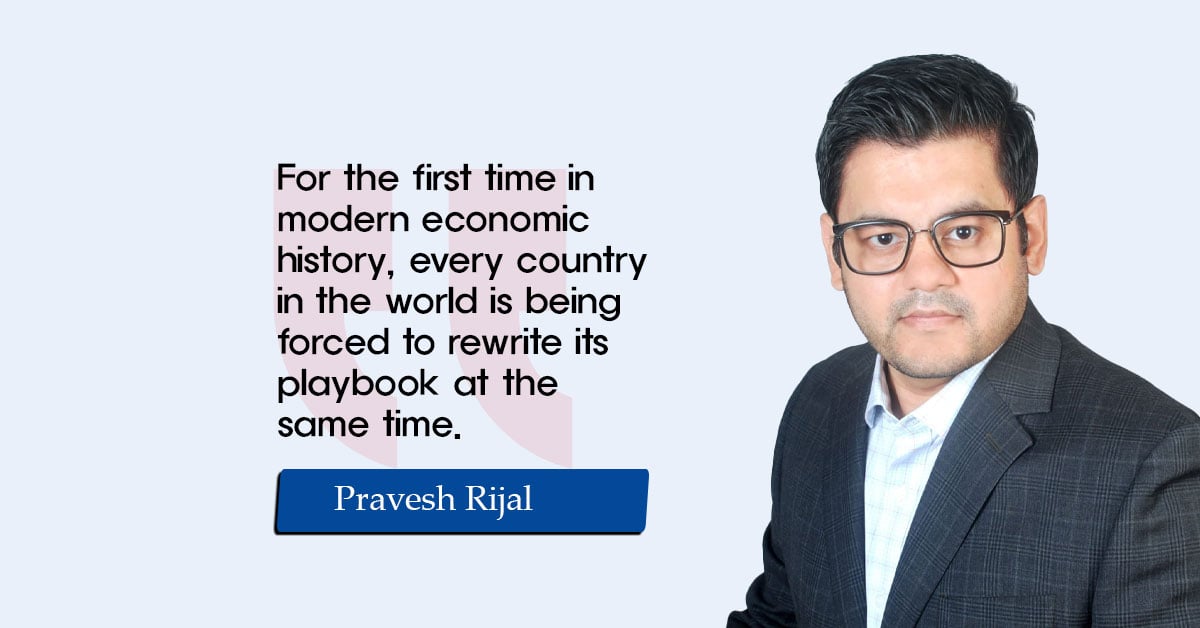

For three decades, remittances have kept Nepal afloat. They stabilized our currency, funded our imports, and softened every economic shock. Yet, they were never treated as strategic capital. The became a source of consumption, not national capability. We allowed the hard-earned income of Nepalis abroad to fuel short-term comfort without building long term strength.
This was and still is a failure of our imagination and strategic planning as a nation. A country that sent millions of its children to foreign soils for survival never built a system powerful enough to bring opportunity home.
Today, that can change.
For the first time in modern economic history, every country in the world is being forced to rewrite its playbook at the same time. Artificial Intelligence, web 3 and blockchain based financial eco-systems, and clean renewable energy are reshaping the foundations of global power. Every nation – small or large – is reassessing its position and redefining its strategy for the next twenty years.
No one has a guaranteed strategy. No one has a settled model. The field is open. And for the first time in decades, we are at the cusp of an inflection where countries without historical scale can move with intelligence and ambition.
Nepal enters this transition with unexpected strength: an enormous cushion of remittance driven foreign exchange. More than 12 billion dollars worth of inflows annually and over 20 billion in reserves have given Nepal financial room that past generations could have never imagined. It is a rare position for a small, import-dependent nation. And it was built entirely through the sacrifice of our men and women who spent decades abroad, away from their families and loved ones, often in harsh and dangerous conditions, to send money home.
We owe them a strategy worthy of their contribution.
This means moving beyond the passive, consumption – driven model of the past. Nepal must use its liquidity to secure presence in the emerging architecture of global influence- an architecture built on compute power, digital finance rails, and clean – stable – green energy to power the data centers and decision engines.
The world is re-organizing around these three forces:
AI– is making computation the new engine of productivity.
Blockchain based systems are redefining settlement, collateral, and financial connectivity.
Clean energy is becoming the global constraint that determines which country can host data centers, model training mechanisms and high density digital infrastructure.
Nepal has all the right ingredients to participate: a young, globally trained workforce; hydropower capacity that can anchor clean-energy compute; and a reservoir of liquidity large enough to begin investing outward with purpose.
Strategic Outward Investment is how now Nepal should enter this new system. Not as a spectator, but as a credible counterpart. When a country becomes co-investor in renewable energy platforms, AI infrastructure or the futuristic financial infrastructure, it earns visibility and access. It gains influence. It gains ability to pull opportunity inward – data centers in Nepal powered by Nepali electrons, engineering hubs staffed by Nepali talent and global financial infrastructure anchored by Nepali institutions. What we need is thinking strategically on positioning in the new world. Traditional reserve management keeps capital passive and insulated. The compute age demands strategic presence. A small portion of our remittance-driven liquidity can be mobilized to participate in global investments that align with our long-term national interest. Beyond investment yield, this gives strategic access to Position. A seat in the board rooms where the future of technology, energy and finance is being negotiated.
This approach will require new thinking, and we should openly acknowledge that. It will NOT fit neatly into traditional economic doctrines or risk frameworks. But it is the new paradigm. The global system Nepal is entering has no established playbook for countries of our size. Evaluating tomorrow’s possibilities with yesterday’s tools guarantees stagnation. Nothing in the last fifty years prepares us for the compute-age economy, and we must resist the instinct to view new strategies through the orthodox lens of old doctrines.
Nepal’s opportunity is not just financial, it is structural. It is our time to play offense. Nepal has already lost too many years to economic indecisions. Multiple decades where potentials drifted, where policy just responded instead of leading, where young people boarded jet planes because country could not build pathways for them at home. We should not repeat its repeated mistakes yet again, by simply waiting for the right framework to emerge. This is a form of hesitation we cannot afford anymore.
We now have once in a generation opportunity to course correct – to turn remittance liquidity into strategic presence, and that presence into long term prosperity. The world is rebuilding its foundations and Nepal can finally build with it. We owe it to the workers who built our reserves, to the children who will inherit our decisions, and to the nation that has waited far too long for boldness.
This is Nepal’s moment, and it should be taken with intent.
Pravesh Rijal is a New York Based global banking executive with deep expertise in finance and capital markets. Born in Biratnagar, he has worked at the frontier of international finance and policy. He often writes on financial stability, macro financial innovation, capital-market reform, and the role of diaspora capital in Nepal’s economic future.